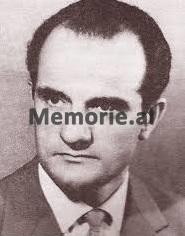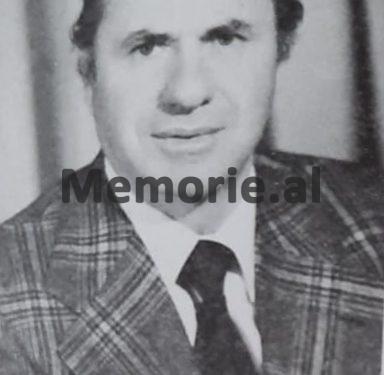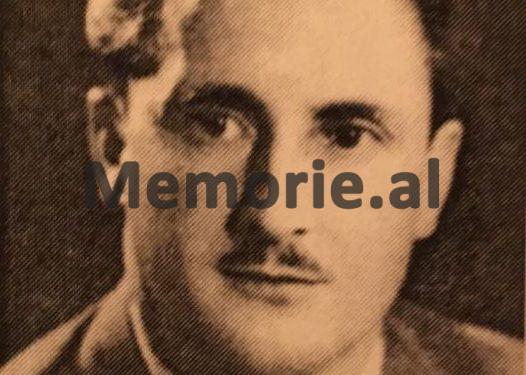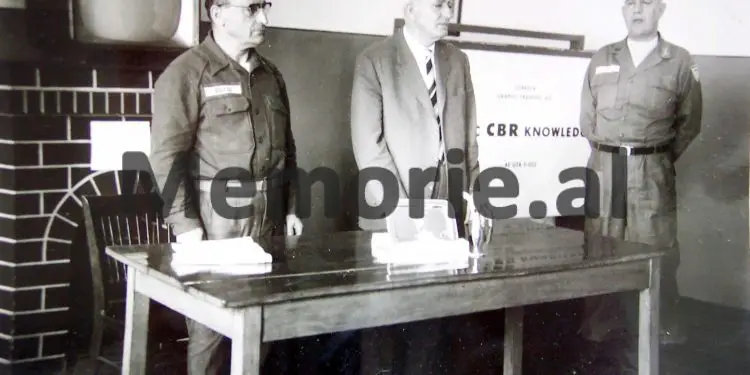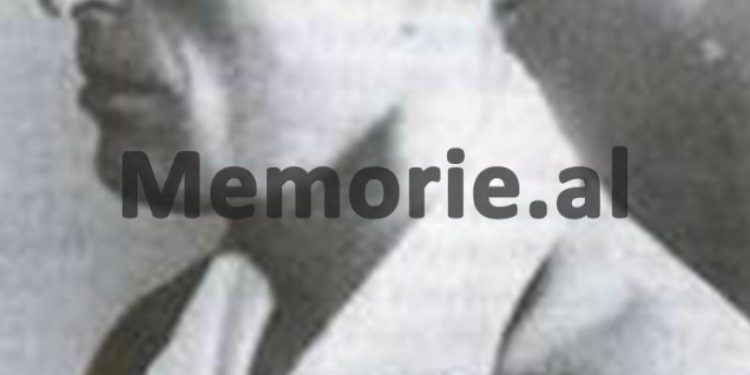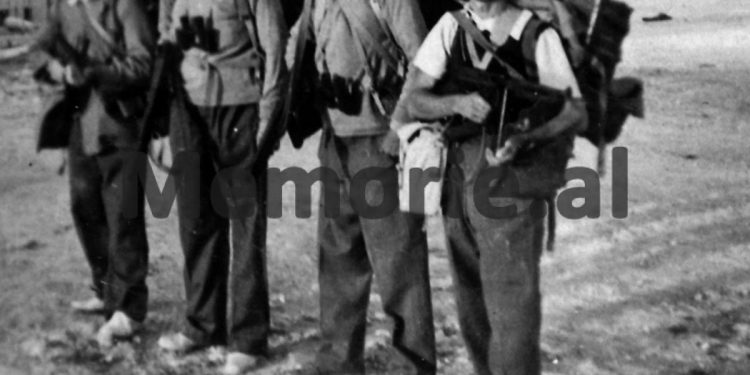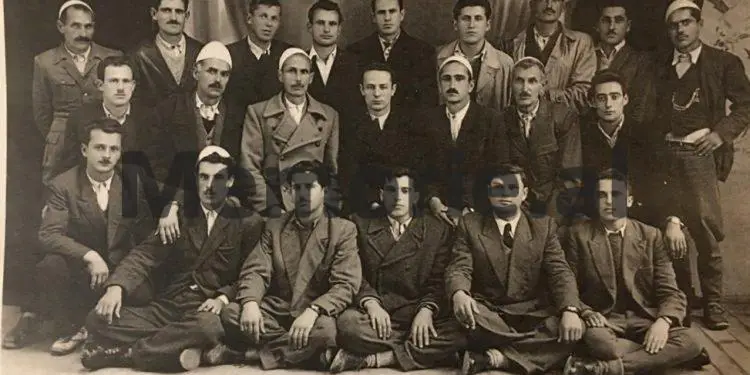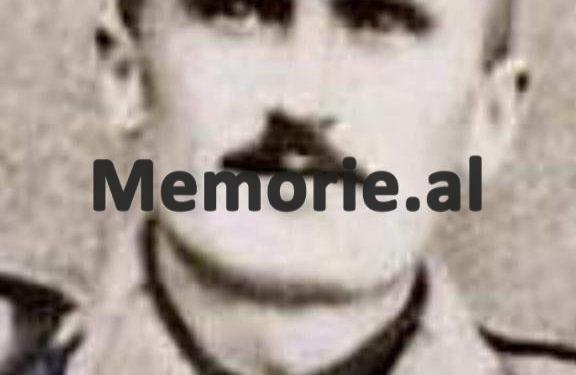Dashnor Kaloçi
Memoria.al publishes the rare and unknown story of Ndue Mëlyshi from Mirdita, where his father, Gjoni was the bayraktar of Kthella, while his brother, Nikolla during the period of the Bird Monarchy served as a soldier in the Royal Guard, and the son to their uncle, Frroku, in the Gendarmerie weapon. How the roads were temporarily separated between the two cousins during the period of occupation of the country, after Frroku fought against the partisan forces in the South of Albania and at the end of the War, he joined Gjon Marka Gjoni in the city of Shkodra, taking revenge for the murder of Lieutenant Colonel Adem Boletini (son of Isa Boletini), from the communists, while Nikola became a partisan, joining the VII Assault Brigade commanded by Gjin Marku, Ramiz Alia and Adil Çarçani, fighting all the way to Visegrad, Yugoslavia. Ndue Mëlyshi’s rare testimony of how he was forced to flee in 1947 with his brother Captain Nikoll Mëlyshi, Pal Mëlyshi’s father (the main character in the movie “Operation Fire”) after the communists burned down the towers and the whole family with women and children were interned in the camps of Kruja, Berat, Tepelena, etc. How did Nduja stay in the mountains of Mirdita in the struggle with the Pursuit Forces until ’49 when he was forced to flee to Yugoslavia together with 53 members of the anti-communist resistance, after the murder of Bardhok Biba, after his brother Lleshi and uncle’s son were shot , Frrok, whose body was cremated with kerosene to terrorize the people of that province. Ndue parachuted into Albania after being trained by the Americans in the Italian camps and wandering through the mountains of Mirdita and Puka until 1952, when he finally left Albania for Italy, Germany and the USA, where he lived until in 1992, when he first returned home to his family (living in the city of Shkodra with his daughter, Bardha Mëlyshi, never to return to the US after 2014) until he passed away on July 31, 2020 , at the age of 109 and was escorted yesterday to the last apartment.
“Bardhok Biba was sentenced to death by our organization and I am sorry that I did not have the opportunity to kill him with my own hand, as he was Stalin’s puppy and not Albanian.” After the answer given by Mark Jak Bajraktari, Major UDB arkarkiç, did not continue the process of questioning our group of Albanians and closed it at all. This made that a few days later, in June, in the camp of Nis where we were, the UDB Major, Cedo Mihjovic came and called Ndue Pjetër Gjonmarku, Ndue Bajraktari, me (Ndue Mëlyshin), Mark Dodë Lleshjan, Marka Jak Bajraktarin and Pjetër Kol Preçin. After calling us in the office, he told us that during the period we were in camps and prisons, we had gone through difficulties, because according to him, the situation in Yugoslavia was still turbulent, but we should not be too upset, as the main thing was the fact that we were alive, because in many cases our lives were in danger. After this introduction, he went directly to the topic, telling us that he had personally intervened in our case and had talked to the Ministry of Interior, to release us from prison, on condition that we form six small groups with by three people and to enter Albania with secret missions ”. The man who speaks and testifies for Memorie.al is Ndue Mëlyshi, originally from Kthella of Mirdita, a former member of the anti-communist resistance forces, who fled Albania in 1949 and was parachuted into Albania after being trained by the Americans in the camps of Italy. Originally returned to Albania in 1992 after four decades of emigration, Ndue Mëlyshi, from 2014 lived in the city of Shkodra with his daughter, Bardha Mëlyshi, until he passed away on July 31, 2020, at the age of 109 and on 1 August was escorted to the last apartment. Although he carried on his shoulders more than a century and a decade of his life, even with endless deprivations and vicissitudes, spending almost half a century away from his family, (wife Mara Markajoni and three daughters: Bardha, Lizeta and Agetina, which left them quite small and found them with children), memory and memory never betrayed him until the last minutes when he disappeared (on July 31, 2020) sitting in his armchair browsing the daily newspapers. Recently, Memorie.al managed to get a long interview with Mr. Ndue Mëlyshi, (recording it with video) in order to publish it on August 7, on the occasion of the sensational event of the murder of Bardhok Biba, an event that terrorized Mirdita and led to the departure of him and 53 members of the anti-communist resistance from Albania. During the conversation, his extraordinary memory as a “living folder”, sometimes came to his aid and notebooks where for years he has chronologically thrown pieces and moments from his troubled life, or the book “Mountain Life”, which he published several decades ago when he was in political asylum in the US. Conveying to the Mëlyshi family the condolences for the loss of their beloved man, in this article we are publishing in full the whitewashed interview we received recently (with the unstinting help of his daughter, Mrs. Bardha Mëlyshi), completing even with some of his notes.
Continued from the previous issue
Mr. Ndue, after Alush Lleshanaku and Haki Blloshimi were found at the Bird Bridge over the Mat River near Milot, where did they go next?
After arriving at Ura e Zogut and orienting themselves well where they were, Alushi and Blloshmi, with all the money they had with them, bought from a bar in the Milot Bazaar and dressed as villagers who had gone shopping, they left on foot of the highway, crossing Laçi, Uja e Bardhë near Mamurras, Zeza, Fush-Krujë, Vora, Tirana, they passed after the Barracks of Ali Rizaj and came out in Krrabë, and in the forests of Elbasan, where after some time, not after the radio broadcast, they crossed the land border and went back to Greece.
What about you with Ndue Pjetër Gjomarkaj, where you went after meeting together.
Ndue Peter and I went back to the areas where we had parachuted in, hoping not to find the radio and other materials we thought the plane had unloaded immediately after us with parachutes. For two days in a row, from 16 to 17 February, we did not leave the place without looking and when we thought we had no hope of finding them, a little without getting dark, we saw the radio at the bottom of a rock that was about 300 meters up. We sat there and after we got the radio, we were able to make an installation and provisional connection with the Center of the “Independent National Bloc” in Rome, but unfortunately we could not do it, because the radio was not working, maybe due to an injury he had suffered. from rolling down on that steep rock.
What did you do after that?
When we could not put the radio to work, we set off again to look for the next parachute that contained food, clothing, and other necessities. It was a big cold with sub-zero temperatures, but we had no hope other than that we could find that parachute. But unfortunately every search of ours turned out to be fruitless, as we would later find out that the parachute, the plane is not known why, had not unloaded it immediately after us, but had thrown it in the Macukulli Forests, after Alushi and Blloshmi.
After losing hope that you could find the parachute, what did you do?
Losing all hope that we could find the second parachute and since we could no longer stay on that mountain for fear that our movements might have been observed, on the evening of February 17 we decided to leave from there. I took the radio on my back with its equipment weighing about 35. kg. e Ndue Peter walked in front of me, stepping on the snow to make my journey a little easier. After a long and very difficult road from the steep terrain, we arrived in the village of Kumbull-Selita, which we had not had the opportunity to go before. From there we continued the journey again and around three o’clock after midnight we arrived in the village of Mërkurth which we knew very well, but we did not stop there at all and we continued the road without stopping at all, until there at eight o’clock in the morning on February 18 , we arrived in the Orosh Mountains. From the great fatigue going through that whole road as well as from the boredom from that defeat we suffered, our soul was about to run out, but we kept alive the hope that we would connect with the radio and meet Alushi and Blloshmi to reorganize and continue our mission.
Could you connect to the radio?
There in the Orosh Mountains we found a suitable place and put the radio in operation, but unfortunately we could not connect to the Center in Rome. After the certain minutes that were foreseen to connect that day with the Center, we found ourselves in great difficulties and almost hopeless, as at first we knew nothing about the situation we were in, we had no food reserves and we also lacked ammunition. , because in case we were to fall in any attempt with the Pursuit Forces, we had only a small “Machine” and two cartridges with cartridges which we would spend on the first rifles. In this situation, we decided to leave the radio somewhere in the Orosh Mountains, in a safe place by covering it on the ground and both with Ndue Pjetr, we started circulating in those villages, we could meet and enter connections with other anti-communist resistance groups we knew were still operating in those parts. The first job we had to do was find a radio technician to be able to connect with the Center in Rome.
Did you meet anyone?
After descending from Bjeshka e Oroshit with a lot of suffering we fell in the village Ndërshen-Orosh, where in a family of this village, we found a very generous hospitality and there we are familiar with the situation we were in and we received the announcement and the black news about the loss of the lives of our mountain comrades who were killed in fighting with the communist forces of the Prosecution, such as: Frrok Mëlyshi, Mark Ndue Bajraktari, Pjetër Llesh Gjoni, Ludovik Saraçi, Mark Cara, Bardhok Marka Gjoka, Pjetër Paloka, Gjin Paloka, Nikoll Gjet Ndoj etc. . We also learned that some leaders of the most important anti-communist gangs, such as Bilal and Halit Kola, Ndrec Lufi and Marka Bib Vokrri, to escape the persecution of communist forces in the great terror that the government of Tirana had undertaken against their population. The mountain shelters had been forced on them and they had fled to Yugoslavia since October 1948. Likewise, large numbers of families and people supporting our comrades in the anti-communist resistance had been shot, imprisoned or interned by the government. communist of Tirana. This news saddened us, and our condition seemed hopeless.
What did you decide to do after this news you received?
After that, although the owner of the house, our brave and generous friend asked us to stay there for a couple of days to recover from the great fatigue and difficult state of mind that those black news added to us, we thanked him and we said we had to continue our way to Kthella as he gave us food with him for two days.
Did you leave after that?
After we got a little bit oriented where we are, we both took the road towards Kthella and when we got there we knocked on the house of our generous and brave friend, who welcomed us as no better than for so short that we have stayed there. It was February 20, 1949 when we entered Kthella and our friend told us everything that had happened during that time with the anti-communist resistance groups operating in those areas. After three days he enabled us to meet some of our mountain friends, such as: Preng Dod Gjinin, Bib Marka Bibën, Preng Zef Tarazhin and Ndue Nikoll Prengën. These four, who were our loyal friends and tried in several armed efforts with the communist forces of the Pursuit Brigades, had connections with other anti-communist groups operating at that time in the Lezha raccoon, such as: Dedë Kolziu, Llesh Marka Doda , Llesh Marka Tuci and Gjon Marka Tuci. After reaching an agreement with our loyal couriers, we met with these four on March 15 in a place called Qafë Molla Forest in Mirdita, where we held a meeting that lasted several hours.
What did you put there?
There in that meeting we discussed and analyzed the very difficult situation where we were and those few anti-communist resistance groups in the province of Mirdita led by: Ndue Bajraktari, Marka Dod Lleshaj, Gjok Dod Përbrunga and Marka Jak Bajraktari, as well as those of Puka under the leadership of Pal and Ndoc Mirakaj. Our connection with those groups was made quite difficult both by the winter weather as Bjeshka e Oroshit had more than a meter and a half of frosty snow, and by the lack of food from the great bread crisis that prevailed in those areas. In these extremely difficult conditions where we were after everything was paralyzed and also due to the pursuit of communist forces operating in those provinces, we settled and dispersed into two groups. In the first group, which included Preng Dod Gjini, Dedë Kolziu and Gjon Marka Çupi, Ndue Nikoll Prenga and Ndue Pjetri and I, we went to the Orosh Mountains to pick up the radio transmitter we had left hidden in a safe place. .
What about the other group?
The other group consisting of Llesh Marka Tuci, Llesh Marka Doda, Bib Marka Biba and Preng Zef Tarazhi, were tasked with supplying food to a center (meeting point) that we would form in Qafë-Molla Forest, as well as to decide liaisons with other groups.
Did you manage to get the radio?
We after a lot of suffering due to the difficulties caused by the heavy snow during our trip, finally went and got the radio where we had left it, but in return, due to the bad weather that started with torrential rains, we did not we were able to cross the Fan River which had become very swollen. So we were left without going to the designated place in Qafë Mollë, which we had predetermined as the meeting point where we would meet again.
What did you do after that?
We were forced to wait for a couple of days for the weather to stabilize somewhat while staying in the Bukli area of Mirdita and then we as a group decided to cross the Fani River to the Karma e Peshqeshit bridge. Thus, on the evening of March 22, we set off in that direction, traveling alone at night in torrential rain and complete darkness. Karma is a very difficult place to travel from the rugged terrain and the steep cliffs and there we arrive with the light coming out. Since we could not travel during the day for fear of being discovered and surrounded by the communist forces of the Pursuit Departments, we were forced to cross the Karma Bridge as soon as daybreak. We had to leave that area as soon as possible, as we were endangered by the communist State Security forces, from there they were very close to St. Paul’s Center.
Were you dictated by them?
As we predicted, unfortunately we were discovered, because around 9 o’clock in the morning some shepherds passed by us and from them we were in great danger. We got into trouble, because if we caught them, it would be an alarm, if we did not catch them, we were not safe, because they could scold us and our situation became very dangerous.
How did you decide… ?!
We did not catch them with a vain hope that they had not seen us, or and if they had seen us, they would not have reported us. But unfortunately, one of the shepherds named Gj. B. Ll. Bardhok Biba, who had been a spy before, after thoroughly investigating our group, immediately went to St. Paul, where many communist operating forces were on standby, ready to act at any time to signal them.
What happened after that person reported about you to St. Paul?
At 12 o’clock that day (March 23, 1949) our group was surrounded by a force of 500 Pursuit soldiers. We were in an unfavorable position either to attack or to retreat and the difficulties were compounded by the weather, as temperatures at that end of March were below zero. The whole place there is with crushed rocks and others so high that it was very difficult to see their peaks and there was no kind of path to cross. The Little Fan River that flows through those areas, cutting the rocks to the depths with a knife, was another strong natural obstacle in front of us. On the other side of the river where the rocks with each other were no further than 500 meters in the air on the tops of the mountains, the communist forces had placed heavy machine guns and fired incessantly with a dense fire.
What did you do in that difficult situation where you were?
For more than eight hours in a row, the four of us stood motionless in the positions we had quickly occupied, under the incessant fire of the numerous communist forces, as their bullets came at us from all sides.
Did they not try to attack all the communist forces that surrounded them?
They tried several times to attack us, but they could not break us and retreated again, leaving some dead there.
Were there any killed by the Pursuit Forces?
In the first attack they attempted, the aspirant of the State Security, Qemal Hoxha, who was covering the district of St. Paul, was killed on the spot. A Special Security Brigade sergeant and four soldiers were killed in the attack. There may have been others killed, but we have seen these with our own eyes.
What happened after these losses by the Pursuit Forces?
Around eight o’clock in the evening when the night had covered the place and nothing seemed to happen, seeing the situation when we were running out of even the little ammunition we had, we decided to attack upwards and go to Malthi Peak, because in that situation when the fire they ignited with more fury, we had no hope of leaving any of us alive. We divided the radio and its equipment into two parts, one I took and one Ndue Nikolli, but having no opportunity to communicate with each other, our group was dispersed in two different directions to save everyone’s head. Preng Dod Gjini and Ndue Pjetër Gjomarkaj have started in one direction, while I with Gjon Marka Çupi and Ndue Nikolli in another direction.
Were you injured on your part during that retreat?
Unfortunately, a few minutes after that withdrawal, Ndue Nikolli was injured and I was forced to come to his aid by taking his radio equipment and together with the radio I had I hid it somewhere quickly but in a safe place and from there we could leave without suffered no other dams./Memorie.al
Continues tomorrow





